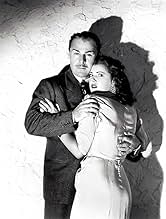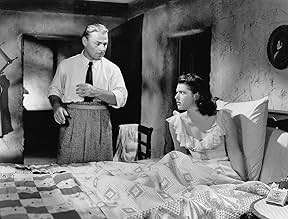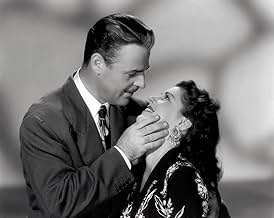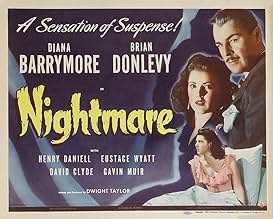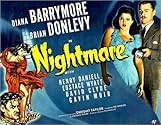An ex-gambler helps a beautiful widow, and becomes involved with a murder, secret agents, and saboteurs.An ex-gambler helps a beautiful widow, and becomes involved with a murder, secret agents, and saboteurs.An ex-gambler helps a beautiful widow, and becomes involved with a murder, secret agents, and saboteurs.
- Director
- Writers
- Stars
- Director
- Writers
- All cast & crew
- Production, box office & more at IMDbPro
Featured reviews
This is a splendid early wartime thriller, with the wonderful plot twist that a corpse with a knife in his back is found and disposed of, but then reappears the next day in the same place with another knife in his back. A Nazi spy code-named SI-10 turns out to be identical with the license plate of his Lagonda, in which a secret microphone/speaker is disguised as a dashboard cigarette lighter. This is the only film ever produced by Dwight Taylor, the well known screenwriter who also scripted this. The main appeal of this film however is the powerful presence of the intensely disturbed Diana Barrymore, who combines womanly charm and fascination with a violent streak so terrifying and uncontrollable that it has rarely been encountered so unequivocally on screen. So powerful is this unsettling violence in her nature, that her tragic life story and suicide all too amply confirm that it was not just acting. As an actress, she was a natural. What a pity that she was so self-destructively mixed up, since a major talent was lost to the screen. She could have been the greatest Barrymore of them all if she could have held herself together. Brian Donlevy does very well as the whimsical American who gets mixed up in this story because he has been 'bombed-out' in the London Blitz while dressed in his dinner jacket. There are no gag lines in this script. It is a dark and brooding work, made darker by the London Blackout of course. There are many highly tense moments, and this thriller really works.
Brian Donleavy is broke and at loose ends until his ship leaves for America, so he enters a private home to make himself some ham and eggs. The owner, Diana Barrymore, discovers him, and he's about to leave without a fuss, when she asks him to remove the body of her husband from his office. He's got a knife in his back. Donleavy disposes of it, but when he returns, Miss Barrymore high-hats him... until she asks him to remove the body, which is back where it had been. At this point, the police break in the front door, and the two flee the premises.
It's a great start to the movie from a story by Phillip MacDonald, but it soon turns into a retread of THE 39 STEPS, with a trip to Scottish mansion. Donleavy offers a solid performance as usual, but Miss Barrymore seems more confused and withdrawn than her role calls for... and that seems inconsistently written. She does photograph beautifully with George Barnes handling the cameras.
It's a great start to the movie from a story by Phillip MacDonald, but it soon turns into a retread of THE 39 STEPS, with a trip to Scottish mansion. Donleavy offers a solid performance as usual, but Miss Barrymore seems more confused and withdrawn than her role calls for... and that seems inconsistently written. She does photograph beautifully with George Barnes handling the cameras.
Another one of those "wrongfully accused man and woman on the run" thrillers, notable only as one of the few starring vehicles for John Barrymore's daughter Diana. Brian Donlevy is slightly miscast as a down-on-his-luck gambler who inexplicably gets involved with a woman who may have killed someone. Also Nazis because 1942. It's all rather muddled and hard to follow or care. Donlevy's dialogue makes me think his part was written with Humphrey Bogart or maybe Alan Ladd in mind. For her part Diana Barrymore has a bland screen presence and spits out her lines like they taste as bad as they sound. Supporting cast is ok. Slow pace with no memorable scenes. Not a particularly good picture.
1942's "Nightmare" was a higher budget 'B' from Universal, who were hoping that name value would make a star out of top billed Diana Barrymore (John's daughter, Drew's aunt). Unfortunately, her obvious talent failed to translate into box office success, quickly retiring from the screen, only to star in tabloid headlines for the rest of her unhappy life (dead at age 38 of a drug overdose in 1960). This particular feature may be her finest showcase, with a most unorthodox leading man in 40 year old Brian Donlevy, whose character, an American stranded in London, raises nary an eyebrow when she asks him to dispose of a dead body in her upstairs study. We later find that the corpse is that of her long unseen husband (Henry Daniell), who turned up on her doorstep in time to be murdered by persons unknown, but not before offering up a dying clue with his last breath. Understandably fearing that she might be arrested, and puzzled when the corpse winds up back in the study after being safely transported across town hours before, she ends up swiping a car so they can escape to Scotland to visit her wealthy cousin (Gavin Muir). Brian Donlevy proved to be an underrated leading man, but did fine work here, and in Fox programmers "Half Angel," "Born Reckless," and especially "Midnight Taxi." Henry Daniell is criminally wasted, but other small roles are well played by such familiar performers as Arthur Shields, Hans Conreid, John Abbott, and Ian Wolfe (playing a nastier butler than usual). Holds up fairly well until the end, but definitely NOT a horror film, despite its status among Universal's SHOCK! package of genre titles issued to television in the late 50's (Pittsburgh's CHILLER THEATER never showed it, but Minneapolis' HORROR INCORPORATED did).
Nightmare is one of those routine noir films with a wartime era plot from Universal that Alfred Hitchcock might have been able to put over. I saw elements of Saboteur, The 39 Steps and the later North By Northwest in the story.
What Nightmare does give us is a chance to look at Diana Barrymore in one of the few films she made. She certainly had the classical training that enabled her to cast as an Englishwoman who has just had her husband murdered. The husband is played by Henry Daniell and sadly he's on ever so briefly.
Daniell is working on discovering a 5th columnist in the wartime United Kingdom and he turns out to be in the family and titled. Brian Donlevy like any Hitchcockian hero sort of stumbles into the situation.
Nightmare is a good, but routine wartime espionage story. It's a no frills product from Universal which would not have afforded those added Hitchcock like touches to make it truly great.
What Nightmare does give us is a chance to look at Diana Barrymore in one of the few films she made. She certainly had the classical training that enabled her to cast as an Englishwoman who has just had her husband murdered. The husband is played by Henry Daniell and sadly he's on ever so briefly.
Daniell is working on discovering a 5th columnist in the wartime United Kingdom and he turns out to be in the family and titled. Brian Donlevy like any Hitchcockian hero sort of stumbles into the situation.
Nightmare is a good, but routine wartime espionage story. It's a no frills product from Universal which would not have afforded those added Hitchcock like touches to make it truly great.
Did you know
- TriviaShooting lasted from August 25-mid October, released November 13.
- GoofsWhen Daniel Shane (Brian Donlevy) accuses a character of treason, he is warned that there are strict laws against libel in England. Libel applies to published statements. Since the accusation was spoken, not written, the correct term would be slander.
- Quotes
Daniel Shane: [to Leslie Stafford] You've got a Tiffany front but a hock-shop in back - I can see through you like cellophane.
Details
- Runtime
- 1h 21m(81 min)
- Color
- Aspect ratio
- 1.37 : 1
Contribute to this page
Suggest an edit or add missing content

